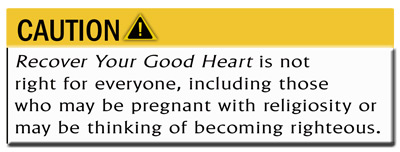
Review of "Recover Your Good Heart"-- Joel Brueseke
 Thursday, October 9, 2008 at 3:38PM
Thursday, October 9, 2008 at 3:38PM A review of my book, Recover Your Good Heart, from blogger Joel Brueseke:
In the midst of a church culture that tends to put a huge emphasis on outward behavior change and religious activity, Jim Robbins’ book Recover Your Good Heart is a refreshing and much needed look into the true life that we have in Christ that is lived freely and abundantly from within -- through the new heart that God gave us when we were raised to life with Christ.How many Christians are still living with the mentality of something that was true at one time -– that our hearts were deceitful and desperately wicked -– when the scriptures tell us that in Christ God has taken away the old, unredeemed, sinful heart and placed in us a brand new heart that is holy, righteous and good!
It’s in our new God-given heart that we find real life and our true identity. Robbins examines the scriptures to show us what this new heart is and how we live from our good heart rather than trying harder to become something better. I highly recommend this book for anyone who tends to live in guilt and shame, or for anyone who simply wants to grow in understanding their true identity in Christ so they can freely live the life they were always meant to live.
--Joel Brueseke, www.graceroots.org
What sounds holy isn't always
 Monday, October 6, 2008 at 1:41PM
Monday, October 6, 2008 at 1:41PM  This past week, I heard two prominent pastors, both of whom have large audiences, declare their wretched, sinful nature over the airwaves. Nothing particular was revealed, just a general confession of miserable unworthiness. It's the "let's just admit we're screwed up and be honest about it" thinking.
This past week, I heard two prominent pastors, both of whom have large audiences, declare their wretched, sinful nature over the airwaves. Nothing particular was revealed, just a general confession of miserable unworthiness. It's the "let's just admit we're screwed up and be honest about it" thinking.
I'm all for authenticity, but isn't being authentic admitting who you really are? Apparently, we don't know who we really have become in Christ. One of these church leaders said that his job was to "make Jesus look good and sometimes that means I need to honest about how bad I am." He followed that claim with the idea that we need to believe that God is sovereign and that we're "totally depraved." (Echoes of Jeremiah 17:9 --"The heart is deceitful above all things..." ) The problem with harkening back to a passage like that in Jeremiah, is that it expresses an Old Covenant reality, not a new one. Remember, there is a progression in Scripture for how God relates to his people.
We've been taught to read the entire Bible, including the Old Covenant, as if it is a current and enduring description of the human personality (including those who have trusted Christ). In some cases, it is an accurate and timeless description of the human condition. In some cases, it is no longer. Jeremiah 17:9 is a good example. The statement is true...of a heart that has not come under the transforming redemption of Jesus. Those who reject Christ are still under the ruined nature of a depraved heart. Those who have said 'yes' to Jesus are no longer under ruin. Their hearts have been restored through supernatural, invasive surgery---the giving of a new and radically pure heart for a corrupted, diseased heart. This is the promise of Ezekiel: 36:26: "I will give you a new heart and a new spirit..."
I like these two guys because they've dumped much of the religiosity of contemporary churchianity. It seems, though, that their self-disclosers, while sounding holy, are a gross misrepresentation of their actual identities, their new and renovated hearts.
We need a different version of 'authenticity' that both acknowledges our areas of brokenness and sin, while stubbornly rehearsing our new nature. Our natural inclinations as Christ-followers have now become those of Jesus, whether those inclinations are obscured and buried or not. Authenticity must now be about confessing a new self and indulging the deep desires of our new identities.
Expecting to sin
 Monday, September 29, 2008 at 11:17AM
Monday, September 29, 2008 at 11:17AM  The following is a response from a good friend to a question I posed to him. The question was: “What have you been told about your heart–even after becoming a Christian?” Here's my friend's response:
The following is a response from a good friend to a question I posed to him. The question was: “What have you been told about your heart–even after becoming a Christian?” Here's my friend's response:
“As I look back at my years as a Christian, I am sorry to say that now I see clearly that I have been actually held back in my Christian walk, because I have been receiving the message that my heart is still bad, still wicked. As a result, my expectations for the “abundant life” of which Jesus spoke, have been nil! Because of what was said on Sunday mornings, I expected to sin regularly!"
There are many Christians who would agree with you if you told them Jesus has made their hearts new, that they are “new creations.” Yet, their expectation is that they’ll continue to sin regularly and there’s not much they can do about it, except to rehearse the cycle of failure and shame. They still believe they are predisposed towards wandering and disobedience, and not towards goodness. –Inclined towards rebellion and self-will, and not towards the new implanted and surprising Spirit-wrought vitality and holiness that is now within them. Why?
Because they have been given a distortion of the Gospel for so long that anything that challenges that entrenched distortion is seen as suspect. Familiarity breeds contempt for fresh insight, even the kind that could lead to the very life they long for in Jesus.
We need to start having expectations that are aligned with our new heart, indulging our new appetites and desires for goodness that we now possess..
Review - "Recover Your Good Heart," Dwight Edwards
 Monday, September 22, 2008 at 6:12AM
Monday, September 22, 2008 at 6:12AM
 Jim’s new book, Recover Your Good Heart, recently received praise from Dwight Edwards, author of Revolution Within, and advisor to Larry Crabb. Here’s the review:
Jim’s new book, Recover Your Good Heart, recently received praise from Dwight Edwards, author of Revolution Within, and advisor to Larry Crabb. Here’s the review:
“I cannot recommend Jim Robbins’ book Recover Your Good Heart highly enough. With profound insight, compassion, and solid biblical support; he resurrects one of the most forgotten and overlooked truths in our day — We are not the same people coming out of conversion that we were going in! Our sin nature and old heart are not eradicated but they are offset with a glorious, unalterable, supernatural reality. We have new hearts, new inclinations, and a new identity. We are far more than forgiven sinners. We are renovated saints with new hearts, good hearts; which come wholly through the Holy Spirit. Thank you Jim for reminding us that our hope for godliness is not gritting our teeth and trying harder. It is falling back on the resources and power of our good heart, the “heart of flesh”, birthed at conversion and appropriated throughout our lifetime. A great work!"
Dwight Edwards,
advisor to Larry Crabb
www.kindlingforthefire.com
Training scars
 Tuesday, September 16, 2008 at 12:40PM
Tuesday, September 16, 2008 at 12:40PM Law enforcement and the military have a term for an inappropriate or mistaken response that was mislearned during training, a behavioral script that gets laid down during the officer's training that would clearly not be helpful in a real situation, or perhaps even yield a deadly result. The term is "training scar." David Grossman, in his book, On Combat, describes an officer-in-training who learned how to grab a gun out of a would-be criminal's hand. During practice, the officer would grab a gun from a colleague, then give it back to him in order to rehearse it again. During a real confrontation with an assailant, the officer surprisingly grabbed the gun from the man's hand, then gave it right back to him. Fortunately, the officer's partner dispatched his own weapon and shot the attacker. The officer who had learned an inappropriate response during training -- giving the gun back -- nearly cost someone's life. That's a training scar.
The Church today is functioning with numerous training scars, or behavioral scripts that are not serving us well. These scripted beliefs are wreaking havoc on The Body. These rehearsed patterns of thought are perhaps even neurologically wired into our brains in ways that lock the spirit and body (Spirit and Body) into dis-ease. The training scar I'm particularly concerned about is our continuing belief that the human heart remains dark, inwardly bent and sinful even after Christ has given the Christian a new heart, goodness and identity at their conversion. We have remained in the Old Covenant approach to relating, refusing to pass over into the New. Listen to most sermons on any given weekend, and you'll discover the following ingrained script: "Your heart is still selfish and prone to wander. Kill you heart and call that 'holiness.' It's our job to help you behave more like a Christian so that you can do more, be more committed, and stop being so spiritually inept. You don't really want to follow God, so we'll pressure you into becoming like him." The script of "New creation in Christ, but bad heart, still" is the pervasive training scar of the day. It is not the Gospel. And the result to the unwitting Christian is this wound: "You're not pleasing to me. Try harder." ---------------------------------
For more on behavior scripts, see Laurence Gonzales' books, Deep Survival and Everyday Survival. "Training scar" gun story, from Everyday Survival.
What the Spirit has already given
 Tuesday, August 26, 2008 at 9:57AM
Tuesday, August 26, 2008 at 9:57AM Don’t most of us think that the fruit of the Spirit is something we need to attain to, desire more fervently, and try harder to produce? --Something we don’t have much of at all? Or, we have a bit of this one or that, and scarcely others on the list?
• “God, help me to be more patient with my children.”
• “God, my life feels pretty joy-less. I want more of your joy.”
• “God, help me to be more kind to ___________.”
In each case, the assumption is that we either don’t have the particular fruit or that we have so little of it that we fear we’re disappointing God. But what if this isn’t the case? Since Jesus goes directly after the heart when he rescues the person, we should begin to assume some very different things about ourselves:
• We have new hearts. …and God only gives what is most like himself. Good, pure, radiant, vibrant. - That’s what our heart is like even now, despite the fact that this new goodness may appear obscured.
• Your new heart now wants what Jesus himself wanted. You want to live in his goodness. (It’s a much better alternative to the cycle of addiction and shame.)
• Because you have a new heart, you now possess the character of Christ, already. And this is called the “fruit of the Spirit.”
• This fruit is already within you …substantially, though you may be unaware of it.
• What God wants to do through his Spirit is to nourish and release that fruit in increasing measure.
To discover more about your new heart, read excerpts from Jim’s new book, Recover Your Good Heart. Click here.
Podcast -- Jim is interviewed
 Wednesday, August 20, 2008 at 6:01PM
Wednesday, August 20, 2008 at 6:01PM Special Guest, Jim Robbins — interviewed on Family Room Media’s weekly podcast. I was interviewed by the guys at Family Room Media about my new book, Recover Your Good Heart.
Topic: The work of Jesus goes far beyond forgiveness. It is a rescue of the heart. This is why the follower of Christ already has a new goodness, new power and new desires.
Thanks to David, Bob, and Loren at Family Room Media.
__________________________
To read excerpts of Jim's new book, Recover Your Good Heart -- Living free from religious guilt and the shame of not good-enough, CLICK HERE.
Getting off the paper
 Friday, August 15, 2008 at 11:01AM
Friday, August 15, 2008 at 11:01AM  If we're honest, many of us have this impression that even though we may have "asked Jesus to come into our hearts" at some point, he seems to have left ... sort of.
If we're honest, many of us have this impression that even though we may have "asked Jesus to come into our hearts" at some point, he seems to have left ... sort of.
It's as if we call on him to come pay us a visit, to help us out in this situation or that; and then his nearness dissipates. The God who fades. But what kind of assumption might this discouraging view of Jesus be founded upon?
We say that the Cross and Resurrection is about an exchanged life -- his for ours. But don't we look at this rather forensically -- as if the whole deal occurs on paper, like a contract with each side's lawyers signing off on it? Wouldn't it be better to assume that something actual was exchanged: that a sin-sick and dead heart was removed, and a new and supernaturally radiant heart was given?
There is no virtual reality here. Not in this Kingdom.
I think our problem is that when we imagine Jesus giving something to us, we think he gives us a substance, something other than himself. For example, we ask for "more grace." So is grace a solid, liquid, gas? - A powder or something transient and illusive? Of course not. Grace is Jesus saying to us, "Take me. ...
I am what you need. I'll bind myself to you, as you."
So why do we think he comes for a brief visit to fix a problem or answer a prayer, yet slowly disappears again as a ghost? It's because we don't believe that the incarnation -- the self-giving of Jesus -- still continues within us today. Not just for us, within us.
It's also why we don't believe anything supernatural really happened to us at conversion. (Again, it's that on-paper-only problem). When he rescues, he gives himself. When he performs spiritual surgery, he gives himself. When he gives us a new and supernaturally- purified heart, he gives us his own. That's why the Christian's heart is good now, actually good.
"Take mine. I am what you need. I'll bind myself to you, as you."
__________________
Source: "As you.." The Rest of the Gospel, Dan Stone & David Gregory.
I
Expectations that kill the heart
 Thursday, August 7, 2008 at 11:31AM
Thursday, August 7, 2008 at 11:31AM One of my good friends said that because of the message he was hearing in church, he expected to sin regularly. Why is this?
Because the message of the church today may not, in fact, always be the message of Jesus. His offer is not simply "get forgiven -- go to heaven." Jesus' message is, "I will give you a new heart." -- Radiant, strong, inclined towards goodness ... and not towards sin. More to the point he says, "I will give you my own heart, removing the one that used to lead you into sickness, distrust and rebellion." Take my heart.
You can now expect holiness from your heart, the goodness and vitality of Jesus himself within you. And this gives you permission: to indulge your deepest desires -- for they are now untainted and noble. (Didn't God promise to "give you the desires of your heart?" How did he do that?) He gave you a new heart -- with fresh desires, some of which are unique only to your heart.
You can now expect to dream more earnestly.
Delight more relentlessly.
Resist your tempters more confidently.
Your heart is stronger and more noble than you think. Expect that.
Is trying hard to act like a Christian the real point?
 Tuesday, July 22, 2008 at 12:19PM
Tuesday, July 22, 2008 at 12:19PM
 Today’s Church preaches a partial, and therefore weakened, anemic gospel. The Gospel has been reduced to: get forgiven—go to heaven. You’ve been pardoned, but now it’s your job to be a “good Christian” and keep your nose clean until Heaven. What starts with grace ends in pressure to be good. (Just get people to do the right thing.) The Christian life soon becomes about acting like a good Christian (religious duty) so that you don’t disappoint God or those around you. The externals (behavioral expectations) become more important than internal realities (the new resources of your heart). Even good practices such as serving others, worship, ministry and kindness become religious obligations, rather than the overflow of a new heart that is now genuinely for others and for God.
Today’s Church preaches a partial, and therefore weakened, anemic gospel. The Gospel has been reduced to: get forgiven—go to heaven. You’ve been pardoned, but now it’s your job to be a “good Christian” and keep your nose clean until Heaven. What starts with grace ends in pressure to be good. (Just get people to do the right thing.) The Christian life soon becomes about acting like a good Christian (religious duty) so that you don’t disappoint God or those around you. The externals (behavioral expectations) become more important than internal realities (the new resources of your heart). Even good practices such as serving others, worship, ministry and kindness become religious obligations, rather than the overflow of a new heart that is now genuinely for others and for God.
Here’s what one Christian discovered about the emptiness of living from religious duty and obligation:
I was a faithful Christian. I went to church every week and joined the men’s ministry—even went on a mission trip to Bulgaria. I want to say I was living for God, but I was living more out of duty and obligation. It was the ‘wanting to do the right thing’ type of living. On the outside I was the model Christian. However, I had a nagging sense of ‘there is something more,’ but I could not identify what the ‘more’ was.[i]
Any “gospel” that pressures people to be good inevitably brings shame; because ‘good enough’ is never good enough. How do we recognize the gospel of duty and pressure, and therefore, shame? This false gospel comes with the following message: “You’re not doing enough, you’re not spiritual enough, committed enough, selfless enough.” It’s the “not enough” gospel and it is often called “sanctification.” And how can you argue with that? Don’t you want to grow spiritually? Shouldn’t we serve, become more “Christ-like,” be committed to the mission? Here’s a troubling question, though: How can you ever know when enough is enough?
- When you’ve read your Bible enough?
- Shared your faith enough?
- Been committed enough?
- Love God enough?
To learn more about why good Christian behavior is not the point of Jesus' message, explore Jim's new book, Recover Your Good Heart -- Living Free from Religious Guilt and the Shame of Never Good-Enough.
[i] Finnamore and Garvin, Treasures of the Kingdom, Vol. 1, (Coeur d’Alene: Starlight Publishing, 2007).
"Recover Your Good Heart" ------- READER COMMENTS
 Saturday, June 28, 2008 at 3:17PM
Saturday, June 28, 2008 at 3:17PM  REVIEW:
REVIEW:
An eye-opening and encouraging offer of hope for those of us who have tried, through our own efforts, to be a "good" Christian and have known the shame and guilt of failing.
Recover Your Good Heart helps us recover the rest of the truth of the Gospel (that God changed us and placed in us a piece of Himself, His heart, upon salvation) and teaches us that we can live from this goodness and not from our old ways.
A much-needed message for new and long-time Christians alike. - C.D.R, Connecticut
_______________
REVIEW:
If you have ever been to church and left feeling empty, condemned, tired, or not good enough; this is an essential read. As Christians we sometimes forget God's promises of forgiveness and feel as though we have to do things to earn God's love. Well, we don't! Neither do we have to work to "be better". God gave us a good heart. This book is an up-lifting read that uses scripture and Biblical truth to show us the goodness of our hearts accomplished by God's work and that we are fully approved and accepted by him.
Recover Your Good Heart will reveal Biblical truths to you and encourage you to live from your heart. I cannot recommend it more. -- Meredith M., Tampa
As the heart goes, so goes a life
 Tuesday, June 17, 2008 at 3:08PM
Tuesday, June 17, 2008 at 3:08PM 
What is meant by the “heart?” We often think that we only perceive with our minds, yet we can “see” with our hearts. In fact, the heart is the hub that governs all other parts of the self—including the mind, thoughts, feelings, the body and the soul. The function of the heart is “to organize our life as a whole…” says Willard. This description of the self is very much a “systems” way of thinking about life, much like the multiple systems of the human body that cannot function without a healthy heart that effectively pumps blood throughout. An airplane cannot fly in a storm without a properly-functioning navigational system, or it will crash. The heart or human spirit is the navigational system for the rest of the human personality: If it goes wrong, then everything else does as well. Willard goes on to say that the redeemed heart organizes our life around God himself. The unredeemed heart would organize a person’s energies around any number of things: fear, control, shame, mistrust. The unredeemed heart is on a desperate search for life, but continues to drive the person to places that cannot give life. We are thirsty by nature, yet apart from receiving a new heart, we will go to wells that cannot satisfy our thirst. It is also true that our real and settled convictions are formed in our hearts. Our deepest convictions—what we really believe about God—are formed in the heart: “For it is with your heart that you believe and are justified…” (Romans 10:10) For example, the unredeemed heart believes that God cannot be trusted and that a person must strive, grasp and control in order to secure an illusion of life. By contrast, the new and redeemed heart sees the world as saturated through with God’s good kingdom, believes that our Father’s heart towards us is actually good, and that we ourselves can live good, whole, and holy lives in his care. This is why even the doubting and feeble Christian can say with relief, “My heart does trust God’s care! I can now trust and enjoy my Father’s good heart the way Jesus trusted him and enjoyed him.” If the heart (spirit) is not right, all the other parts of the self are not right. As goes the heart, so goes our bodies, our minds and our souls. Each part of the human personality is contingent upon the health of our heart. There is no healthy mind without a healthy heart; no healthy soul without a healthy heart; and no healthy body without a healthy heart. It’s obvious now why Jesus’ saving work has to deal with the heart above all else: the health, wholeness and holiness of our lives depends upon the health, wholeness and holiness of our hearts!
Contrary to popular culture’s view, the heart is not the emotional or feeling side of us. Popular culture tends to think of the heart as the sentimental part of us. (Think of Hallmark cards.) Biblically speaking, our feelings can express what is going on in our hearts, but the heart is much more than feelings. According to the Scriptures, the heart or human spirit is the core of our personality—the true and deepest self. It is the also where reason, understanding, and conscience are located
.
[i] John Ortberg, God Is Closer Than You Think, (Grand Rapids: Zondervan, 2005).
Review of "Recover Your Good Heart"
 Monday, June 9, 2008 at 1:22PM
Monday, June 9, 2008 at 1:22PM 
Read a brief review of Recover Your Good Heart -- Living Free from Religious Guilt and the Shame of Not Good-Enough. click here. (Scroll down to the "Reviews" section once the page comes up.)
Praise for Jim's new book!
 Tuesday, May 27, 2008 at 4:30PM
Tuesday, May 27, 2008 at 4:30PM Here is one reader's comments about my new book, Recover Your Good Heart
“I expected it to be good, but it really exceeded what I imagined. I hope a lot of people read it. Your writing is quite good, too…you give practical advice without preaching.” - Meredith, from Tampa
DISCLAIMER!
 Wednesday, May 21, 2008 at 10:50AM
Wednesday, May 21, 2008 at 10:50AM To borrow a disclaimer from the Wittenburg Door magazine, I want to offer a word of caution for potential readers of my new book, Recover Your Good Heart:

But, if you're tired of being told you're not doing enough for the Church, or you're not committed enough, tithing enough, serving enough, loving enough ... then you may find this book completely refreshing. Shame (not good-enough) and spiritual pressure (coaxing people into acting like good Christians 'should') is not the path Jesus offers.
Click here to read an excerpt from "Recover Your Good Heart -- Living free from religious guilt and the shame of not good-enough."
Now available! Jim's new book.
 Wednesday, April 30, 2008 at 4:48PM
Wednesday, April 30, 2008 at 4:48PM 
My new book, Recover Your New Heart is now available.
You can read excerpts or purchase the book at my Lulu.com storefront. (Lulu.com is an online marketplace for independent writers.) Click here to go to the book.
Christians have bought into some very toxic, debilitating (and unbiblical) assumptions about their hearts. This book challenges those assumptions and offers a more hopeful way of relating to God and to others - from the heart.
New book coming soon!
 Sunday, April 27, 2008 at 4:39PM
Sunday, April 27, 2008 at 4:39PM 
If all goes well, my new book -- Recover Your Good Heart -- should be ready for purchase within a week. I'll keep you posted and will announce its release here.
A radiant life is the point.
 Monday, April 7, 2008 at 2:47PM
Monday, April 7, 2008 at 2:47PM
What, in fact, is God’s deep desire for us? What does he long to do for us? Is it not much more than forgiveness? In fact, the Gospel is a message of a restored person. People who are not whole cannot wholly give themselves to something. At the Fall, we lost our selves, because we gave our hearts away.
Heart equals self.
God wants to restore our hearts to us, to give us back our life and our aliveness. As George MacDonald says, the story of humanity’s journey with God is about his longing to give us life, his own: “The whole history is a divine agony to give divine life to creatures. The outcome of that agony … will be radiant life, whereof joy unspeakable is the flower.” And, “All the growth of the Christian is the more and more life he is receiving.”
The invitation is to “radiant life.”
It was God’s original intent, from millennia past to give us a radiant, whole life: “Long before he laid down earth’s foundations, he had us in mind, had settled on us as the focus of his love, to be made whole and holy by his love.” (The Messege, Eph. 1:4) As John Eldredge points out, holiness and wholeness must be taken together. Rather than an austere, painful exercise in super-spirituality, holiness is an invitation to wholeness. We cannot be holy unless we are whole, and cannot be whole until we are holy.
Notice that Christian growth is about receiving more life! Jesus indicated that it was a kind of full-hearted life lived in union with God and all the resources of his Kingdom. Yet, one cannot live full-hearted and substantially restored and still remain under the unkind assumption that one’s heart is still marred, dirty or faithless. Restoration also is not likely to occur when a person believes that God’s primary goal is to get them to behave and act like good little Christians “ought.” That yoke of slavery no longer fits God’s children.
How can we live a new life if we don’t really believe our hearts are treasured and not trampled? Could we even begin to change if we believe God uses shame to change us or pressures us into spiritual conformity? If our convictions about both ourselves and him are wrong, we have little hope of a new life. Is there a better way of thinking about our life in God? About our hearts?
My upcoming book, Recover Your Good Heart, addresses this question by providing a more hopeful way of thinking about our new hearts; so that wholeness and holiness become an already-established power within the believer - a life that he increases in as he walks in his new-hearted identity.
Quotes
 Tuesday, April 1, 2008 at 12:52PM
Tuesday, April 1, 2008 at 12:52PM
"If you, like most people I know, are worn out from a lifestyle of accumulation, then an invitation to a lifestyle of conversation and community is welcome."
- Randy Frazee
----------------------
“God is changing the church, and that, in turn, will change the world. Millions of Christians around the world are aware of an imminent reformation of global proportions. They are saying in effect: ‘Church as we know it is preventing church as God wants it.’ Amazingly, many are hearing God say the same thing to them.”
--Wolfgang Simson (Houses That Change the World).
--------------------
"The spiritual life cannot be made suburban. It is always frontier; and we who live in it must accept and even rejoice that it remains untamed."
- Howard Macey
--------------------
"Freedom is useless if we don't exercise it as characters making choices..."
- Daniel Taylor
--------------------
"The truth lies in a man's dreams... perhaps in this unhappy world of ours whose madness is better than a foolish sanity." - Cervantes
-------------------
“Man finds it hard to get what he wants, because he does not want the best; God finds it hard to give, because he would give the best, and man will not take it.” - George MacDonald, Unspoken Sermons















